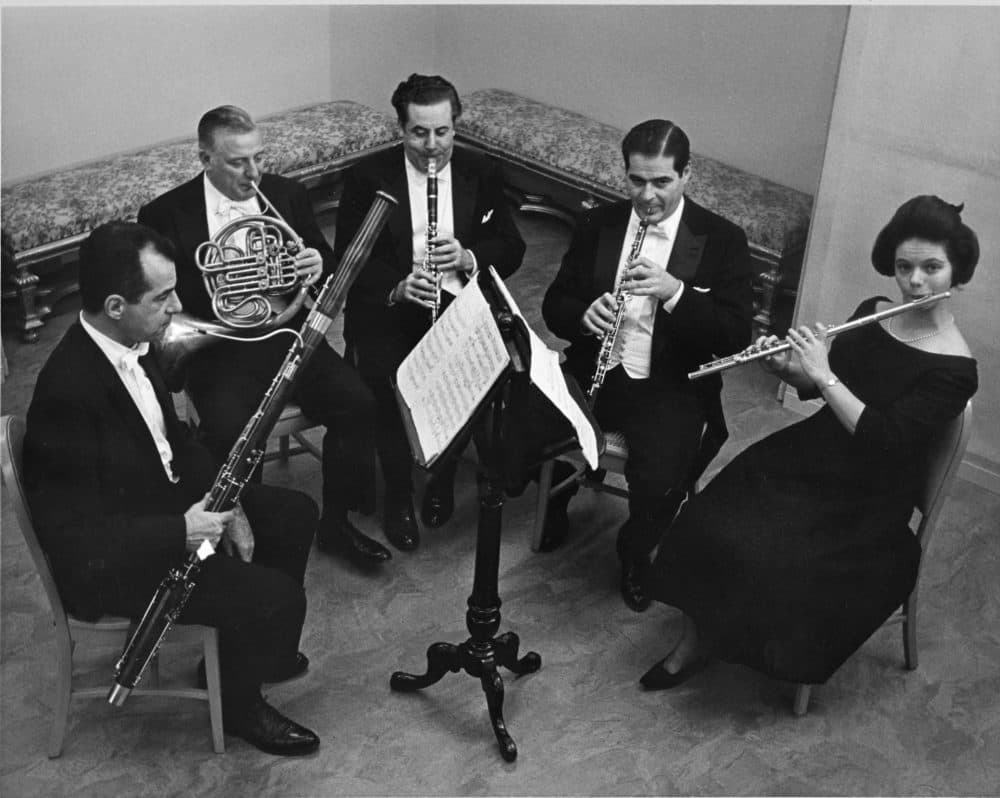Advertisement
Female Flute Pioneer Doriot Anthony Dwyer Dies At Age 98

Doriot Anthony Dwyer, a pioneering female musician who played flute with the Boston Symphony Orchestra for almost 40 years, died March 14 at the age of 98.
Her daughter, Arienne M. Dwyer, said she died of natural causes.
According to the BSO, Dwyer joined as principal flute in 1952 and became the first woman appointed to a principal chair in a major symphony orchestra.
She's long inspired female players who followed in her footsteps, including the BSO's current principal flutist Elizabeth Rowe (no stranger to battling bias herself having filed a gender discrimination suit against her employer for pay inequity in 2018 that was settled in February 2019).
"Doriot's legacy had a major impact on me,” Rowe said in an email, “As a young girl, I looked to her as a rare example of a woman in one of the very top positions in our field.”
Rowe recounted seeing Dwyer in a classical leadership role and said it “helped me imagine that this kind of achievement was possible for someone like me.”
After joining the BSO in 2004, Rowe said she shared meals with Dwyer who offered fascinating stories from her career. “Everything from her adventures as a young star flutist in Los Angeles to dealing with the daily obstacles she faced as a trailblazer in the orchestral world. She told me about her first bravura performance of Bach's famous Suite in B Minor with the BSO, which was when she felt she truly earned the respect of an orchestra which wasn't inclined to be impressed by a woman musician.”
Rowe added Dwyer always fought to be treated with the respect that she deserved.
“Doriot was feisty, energetic, and no nonsense, and a truly unique musician,” Rowe said, “Her playing was marked by a deeply personal expressive style, full of wit and charm, and her legacy continues to inspire generations of flutists, most especially girls."
Dwyer was born in 1922 in Streator, Illinois. The “Anthony” in Dwyer's name came from her father's side. He was a descendant of the famous suffragette Susan B. Anthony.
Dwyer's father was a bassist. Her mother played and taught her daughter flute. Dwyer went on to win a scholarship to the Eastman School of Music. After graduating she joined the National Symphony Orchestra in Washington, D.C.
A few years later Dwyer freelanced in New York City, playing in the Paramount Theater jazz band. She eventually headed west where she auditioned for the Los Angeles Philharmonic and got second chair, then became the Hollywood Bowl Orchestra's principal.
As the story goes, in 1952, when she threw her hat in the ring at the BSO, director Charles Munch was underwhelmed by the pool of candidates vying to replace retiring principal flutist George Laurent. The maestro opened it up for what was called a “Ladies Day” audition.
According to trumpet player Susan Fleet's archives Dwyer said being invited to try out was “the greatest thrill” of her life. Dwyer made a point of adding “Miss” to her gender-neutral name on the application so she wouldn't be mistaken for a man.
During the audition — which is said to have gone on for more than three hours — Dwyer played the solo from Grieg's Piano Concerto by memory. When invited to return for additional auditions, she apparently refused after being grilled about whether she planned to have a family. Two months later, when Dwyer was offered the job as principal flute, she asked for more money. “It’s a lot of money for a little girl,” the BSO manager apparently replied. Dwyer rightly answered, "It's a big job."
Headlines about her hire included this one from the Springfield Morning Union: “Flutist, 30 and Pretty, Here with the Boston Symphony.” The Globe's read “Woman Crashed Boston Symphony: Eyebrows Lifted as Miss Anthony Sat at Famous Flutist's Desk.” (“Desk” is the word European orchestras have used instead of “chair.”)
Dwyer's BSO bio calls her “an important force in enlarging the flute repertoire.” Composers including Leonard Bernstein dedicated works to her. Audiences heard her perform around the world including at her home base Symphony Hall, the orchestra's summer digs Tanglewood, and in Japan on tour with BSO music director Seiji Ozawa.
A 1992 Symphony magazine list included Dwyer as one of 50 people who made a difference in the past half-century.
Dwyer was awarded honorary doctorates from academic institutions including Harvard University, and earned Yale University’s first Sanford Fellowship. She was an adjunct professor at Boston University, and after retiring from the BSO in 1990 taught private lessons and led master classes. Dwyer also continued to perform as a soloist.
In 2012, at age 90, she was inducted into the Rochester Music Hall of Fame where she reportedly played beautifully.
Dwyer is survived by her daughter and her granddaughter.
“She is (and wanted to be) remembered for the subtlety and nuance of her musical interpretation,” Arienne Dwyer said of her mother, “She would want to be remembered for the passion she brought to everything she did. She supported students and all sorts of artists, collaborated and innovated freely, and remained curious about everything.”
